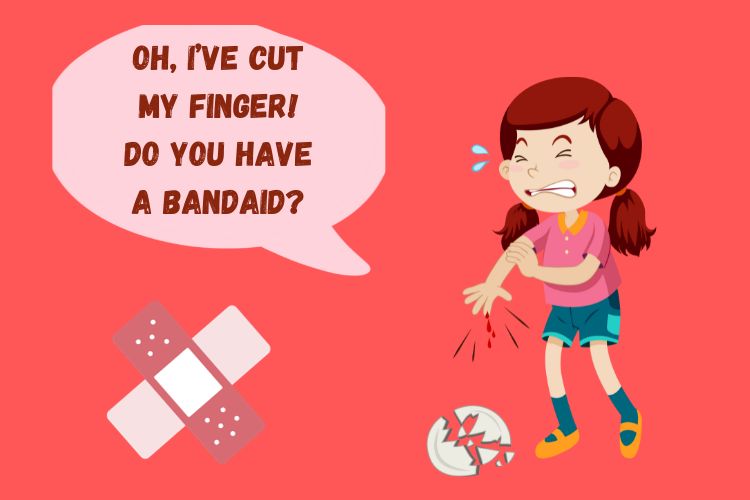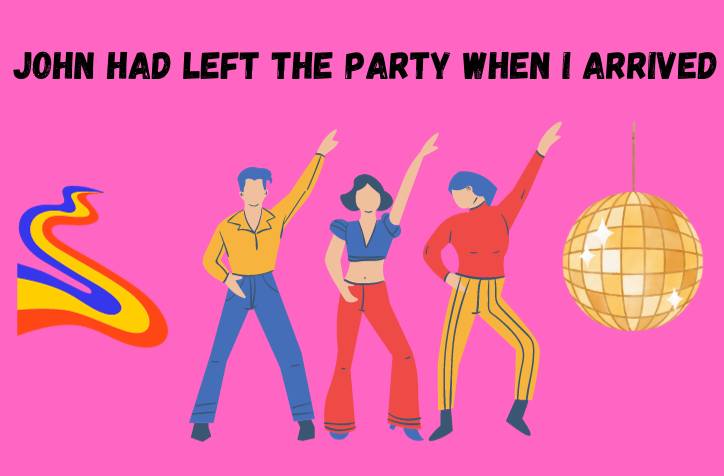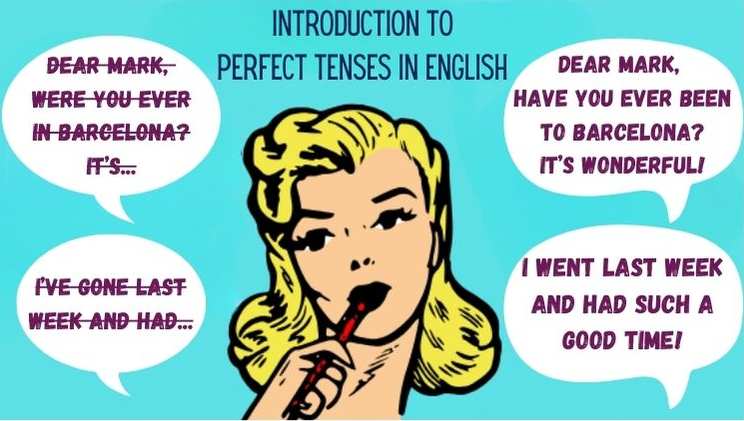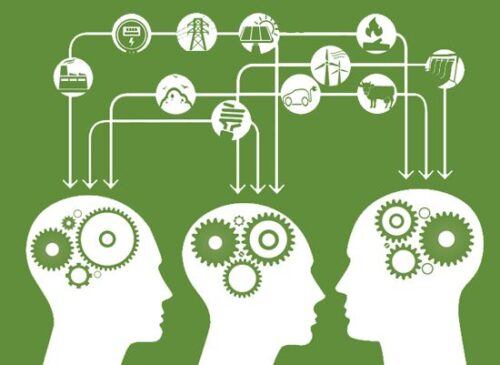When we look at our lives and the world we live in, we see that the past and the present are intimately connected. Things which happen in the past have consequences in the present, and situations we find ourselves in today often started long ago. English recognises this truth with the Present Perfect tense, as well as the Future Perfect and Past Perfect tenses, which emphasise the connection between different moments in time. In this article we will be introducing the perfect tenses in English and discussing them one by one.
Present Perfect Tense in English – has/have done

The Present Perfect’s structure is: auxiliary verb ‘have/has’ + the past participle of the verb
The past participle usually ends in ‘-ed’ (walked, finished), but there are lots of irregular verbs (spoken, written).
Example: ‘You have started to read this article.’
We use the Present Perfect to talk about a situation which started in the past and has some kind of connection to the present. This could be that the action isn’t finished, that it takes place in a period of time which isn’t finished or happened very recently and has consequences in the present.
Unfinished action: ‘I have lived in this house for five years’
I started living here in the past, and I still live here now. The same logic applies to ‘You have started reading this article’. You started in the past, but you haven’t finished reading yet.
Unfinished time period: ‘This year I have been to Barcelona twice.’
I went to Barcelona in February and again in June, but the year isn’t finished – maybe I will go there again.
Event that happened very recently, with consequences in the present:
‘Ow! I’ve cut my finger – do you have a plaster?’
I cut my finger in the past, although only a few seconds ago, and now I need to stop what I’m doing and treat my injury.
An important thing to remember is that when we use the Present Perfect, we don’t talk about when the action happened – i.e. yesterday, in June, last year – because all those words refer to the past. If we use those words, we normally use the Past Simple.
Compare:
‘Today I’ve had two classes’ / ‘I had an English class at 12pm, and a Maths class at 1pm.’
We don’t say: ‘I have had an English class at 12.’ 12pm is in the past – it’s finished.
We can use terms such as ‘today’ or ‘this year’ with the Present Perfect, because these are periods of time that aren’t finished.
We can use the Present Perfect to talk about things which have happened in our lives. This is because our life is also a period which is not finished. So, we can say ‘I have been to France.’ However, if we want to say when we went to France, we use the Past Simple – ‘I went to France last year.’ Last year is a period of time that is finished.
Also, note the difference between the Present Perfect and the Present Perfect Continuous:
‘I have been painting my house.’ – this is the Present Perfect Continuous. When we say this, we are saying that we haven’t finished the process of painting the house.
‘I have painted my house.’ – here, the Present Perfect Simple tells us that we have finished painting the house recently, and now you can see the results.
Past Perfect – had done

The Past Perfect is formed in a similar way to the Present Perfect, but it replaces ‘have/has’ by ‘had’ + the past participle.
For example: ‘John had left the party when I arrived.’
Unlike the Present Perfect, which we use to connect the past and the present, the Past Perfect talks about two connected events which are both in the past. We want to talk about a moment in the past, and also mention something else which happened before it and had a connection to it.
Imagine you come home in the evening and find that your door is open and your television is gone. You then call the police and say ‘My house has been burgled! They’ve stolen my television!’ This happened some time in the past while you were out and has consequences in the present (the open door, no TV, the need to call the police). But then the next week, when the situation is over, you want to tell your friend what happened. You the use the Past Perfect to say:
‘When I got home, I saw the door was open and realised my house had been burgled!’
We are talking about two things which happened in the past, but one happened before the other and caused the second one. First, the house was burgled while you were out. Second, you came home and saw your TV was gone.
For the event which happened first, we use the Past Perfect (‘…my house had been burgled!’), and for the second we use the Past Simple tense (‘When I got home…’).
More examples:
‘When I arrived at the cinema, the film had already started.’ – The film started at 9pm, you arrived at 9.10pm.
‘My mum had cleaned the house before I got there, so it was spotlessly clean.’ – Your mum cleaned the house, and then you arrived and noticed how clean it was.
Future Perfect – will have done

The Future Perfect’s structure is: ‘will have’ + the past participle
We don’t use the Future Perfect very often, but it’s basically the opposite of the Past Perfect. While the Past Perfect talks about something which happened before a certain point in the past, the Future Perfect talks about something which will happen before a certain point in the future.
Examples:
‘We’re late, the concert will have started by the time we arrive!’
‘This time next year, I will have graduated from university.’
In both of these situations, we are putting our mind in the future, and looking back at something that will be completed by that time.
Conclusion – Comparing the Present Perfect, Past Perfect & Future Perfect tenses in English
To end this introduction to perfect tenses in English, let’s demonstrate the difference between the three perfect tenses in English, using three marriages with varying levels of success:
Past Perfect: ‘When David and Sarah divorced last year, they had been married for three years.’
David and Sarah married in 2019, stayed married for 3 years, and then divorced last year. All of this happened in the past, but using the Past Perfect lets us show the order of events.
Present Perfect: ‘Tom and Katherine have been married for almost 6 years now.’
Tom and Katherine got married in the past, nearly 6 years ago, and are still married now. The situation began in the past and continues now, so we use the Present Perfect.
Future Perfect: ‘Next April, Andrew and I will have been married for ten years.’
Right now, Andrew and I have been married for only 9 years, but next April we will celebrate our ten year anniversary, so we use the Future Perfect to imagine that moment.

This article was written by Break Into English’s online teacher and blog contributor James Smyth.








